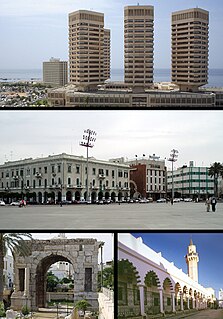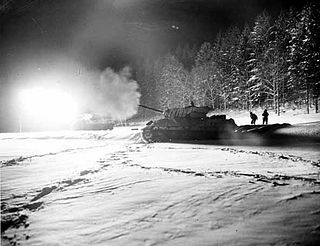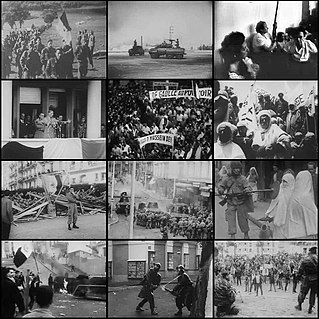
Pierre Joseph Auguste Messmer was a French Gaullist politician. He served as Minister of Armies under Charles de Gaulle from 1960 to 1969 – the longest serving since Étienne François, duc de Choiseul under Louis XV – and then as Prime Minister under Georges Pompidou from 1972 to 1974. A member of the French Foreign Legion, he was considered as one of the historical Gaullists, and died aged 91 in the military hospital of the Val-de-Grâce in August 2007. He was elected a member of the Académie française in 1999.
Jacques Émile Massu was a French general who fought in World War II, the First Indochina War, the Algerian War and the Suez crisis. He is famous for having led the French troops in the Battle of Algiers and for his support and, later, denunciation of torture.
Aimé Marie Antoine Lepercq was a French soldier, industrialist and political figure.

Georges Thierry d'Argenlieu, in religion Father Louis of the Trinity, O.C.D., was a Discalced Carmelite friar and priest, who was also a diplomat and French Navy officer and admiral; he became one of the major personalities of the Forces navales françaises libres. He was the chancellor of the Ordre de la Libération.

The 13th Demi-Brigade of Foreign Legion, was created in 1940 and was the main unit of the 1st Free French Division, Free French Forces (FFL). From the coast of Norway to Bir Hakeim, to Africa then the Alsace, while passing by Syria and Italy, the 13th Demi-Brigade would be part of most of the major campaigns of the armed forces of France during the Second World War.
Gabriel Brunet de Sairigné was a French Army officer of the French Foreign Legion. He was born in Paris, and was killed in the line of duty close to Lagnia Bien Hoa.

Jacques Pâris de Bollardière was a French Army general, famous for his non-violent positions during the 1960s.

Edgard de Larminat was a French general, who fought in two World Wars. He was one of the most important military figures who rejoined the Free French forces in 1940. He was awarded the Ordre de la Libération.
Bernard de Lattre de Tassigny was a French Army officer, who fought during World War II and the First Indochina War. Bernard de Lattre received several medals during his military career, including the Médaille militaire. He was killed in action at the age of 23, fighting near Ninh Binh. At the time of his death, his father, General Jean de Lattre de Tassigny, was the overall commander of French forces in Indochina. Bernard's death received widespread newspaper coverage, with headlines drawing attention to the death of the son of a general. His mother worked to preserve the memory of her son, as well as that of her more famous husband who died in 1952. Their legacy includes an open-air memorial chapel and centre in Wildenstein, Alsace, France. The death of Bernard de Lattre is mentioned in histories of the First Indochina War, and it has been compared to the deaths of other sons of generals and military leaders.
The 1st Spahi Regiment is an armored regiment of the modern French Army, previously called the 1st Moroccan Spahi Regiment. It was established in 1914 as a mounted cavalry unit recruited primarily from indigenous Moroccan horsemen. The regiment saw service in the First World War, and in the Second World War as part of the Forces Françaises Libres, as well as post-war service in the French-Indochina War and elsewhere. The modern regiment continues the traditions of all former Spahi regiments in the French Army of Africa.

Victor Iturria was a French paratrooper during World War II. He served as an anti-tank gunner during the Battle of France and was evacuated to England during the Battle of Dunkirk, where he joined the Free French Forces under General de Gaulle. Iturria was assigned to the Free French paratroopers that joined the British Special Air Service in North Africa, with them he took part in several raids behind enemy lines. In 1944 he parachuted into occupied France during the liberation and fought with the French Resistance in Brittany and then in Southern France, where he was killed in an ambush.
Maurice Amiot was a French soldier who fought in the First Indochina War and the Algerian War. He was killed in action leading his platoon in the Aurès Mountains during the Algerian War.

The Combatant's Cross is a French decoration that recognizes, as its name implies, those who fought in combat for France. The Poilus of World War I worked toward recognition by the government, of a special status to those who had participated in the bitter fighting of 1914-1918. The law of 19 December 1926 created la "carte du combatant", or combatant's card, for veterans of 1914-1918, as well as for the veterans of 1870-1871 and colonial wars before the First World War. The decoration was created only three years later by the law of 28 June 1930.
Gérard Théodore was a French Compagnon de la Libération, having received the Ordre de la Libération for his role in the Liberation of France during World War II.

Aimé Teisseire was a French military officer who fought with the Free French Forces in the African campaign of World War II and later in Europe for the Liberation of France. Wounded multiple times in battle, he was awarded the Croix de Guerre and Order of Liberation. For his service in French Indochina after the war he was made a Grand Officier of the Légion d'Honneur.
Amiral Georges Cabanier was a French Naval Officer and Admiral, in addition to Grand Chancellor of the Légion d'honneur.

Jean-Marie Querville, was a French Navy officer of the Free French Naval Forces, a Compagnon de la Libération, became the Commander-in-Chief for the Mediterranean, then Maritime Prefect, following as an inspector general of the Marine Nationale and Admiral.
Gabriel Bablon was a Frenchman and Compagnon de la Libération. A Legion Officer seconded from the ranks, whom already accumulated more than fifteen years of service, when the Second World War commenced, he refused any sort of defeat and decided to pursue combats in the ranks of the Free French Forces. Engaged in the Western Desert Campaign, he illustrated capability during the Battle of Bir Hakeim and the Second Battle of El Alamein. He participated then to the Italian campaign and the Liberation of France. Pursuing later his military career after the war, he served in Indochina and in Germany before retiring.
Jacques Hébert was a French politician.





















